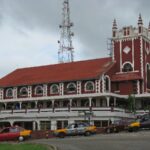There should have been nothing, but praise and gratitude for the Economic Fighters League’s Ernesto Yeboah for taking a stand against the constant assault on our humanity and dignity by Members of Parliament. Freedom and justice have seldom been attained without upending the system set by the people against whom you aim to protest. Ghana’s independence movement, the women’s movement, South Africa’s fight against apartheid, and countless more should have taught us that. None of these movements would have accomplished their objectives without radical strategies and tactics. Yes, Ernesto Yeboah’s protest was disruptive, but his methods weren’t inappropriate.
For so long, MPs have taken us, the people who pay them, for granted. They come to Accra with the promise to improve our communities and lives through their work. We give them everything to make this possible–car loans, rent-free accommodation, immense power, and privileges. But once they get here, they pass bills and laws and approve agreements without consulting their constituents. They put their party and collective interests above ours and the country’s.
It was time someone told them that enough was enough. Despite public anger over the decision to build a new chamber, MPs debated the issue as though we were insane to be offended by the fact that MPs from constituencies without basic amenities had earmarked $200 million to build a new Parliament. During that debate, the MP for Adansi-Asokwa, KT Hammond, said: “MPs cannot sit under trees,” to which Ernesto Yeboah replied, ”Drop that chamber.” Hammond’s comments reflect the deep lack of respect MPs have for the people who elect them. It is as insulting as the decision to build the chamber.
But it was Ernesto Yeboah who got berated for protesting. Aside from being dragged and cuffed by security personnel, much has been made about the nature of the protest. Why did he “disrupt the business of the Parliament?” Some, including a veteran journalist, have said Ernesto Yeboah should have sought permission before staging the protest. Others have said protesters must be peaceful and operate within the law, basically, “do not disrupt Parliament.” These questions will not surprise Ghanaian feminists who often get asked similar questions. Why are we so angry? Why can’t we make our demands nicely?
These questions arise out of a complete lack of understanding of direct modes of resistance which includes civil disobedience and boycotts. Citizens have a moral responsibility to challenge unjust laws and policies. Ernesto Yeboah was exercising this right and the right to free speech when he yelled at MPs in Parliament. He was using that moment to express his outrage over their decision to spend millions on a new building when thousands of children study under trees all over Ghana. Protests are messy, sometimes peaceful, often impolite and disruptive, but they matter and are necessary. It is one of the many ways citizens can participate in the decision-making process.
Often when terrible thing happens in Ghana, say, when a government make an idiotic decision or Parliament plots to waste our, we (citizens) ask, “What can we do to get justice? How we can we force the government to do better?” We rage and rage and wait until the next election. We seldom protest, refuse to comply with laws or resist projects. But we covet other people’s protests and social justice movements.
Right now, we are in awe of the brave people of Sudan who have spent the past five months protesting. During this period, they have dispatched the dictator who ruled the country for over 30 years and two more leaders that emerged after him. We’re inspired by the fearlessness of young people in Hong Kong who have forced the chief executive to suspend the passage of a contentious bill. Both protests teach us not to accept the status quo because change is possible if we’re brave enough to fight for it. They tell us that sometimes the people win.
By speaking up in Parliament, Ernesto Yeboah was showing us how to take some of our power back. MPs knock on our doors, braid hair and pound fufu during election campaigns just to get our votes–and turn around and treat us as if we are their subjects. Ernesto was asserting his right as one of the employers of MPs. Imagine what a strong message we would’ve sent the governing class if we had rallied around him. What a magical moment if we had turned up the next day demanding a complete withdrawal of the plan.
People have also said he staged this protest to be popular. There are far easier ways to be popular in Ghana than spending time in the custody of our police and “national security,” but you never know with humans. What we know is that Ernesto Yeboah shows up when it counts, always in support of justice and change. When a group of feminists organised a march in solidarity with jailed Ugandan activist and scholar, he marched with us. He and his group, EFL, showed up to support the solidarity march for Sudan. It is possible he does believe that our freedoms are connected and that change will only come when citizens recognize their power. Whatever his motivations may be, he showed courage when it mattered.
Powerful people may ignore a one-man protest, but they could never ignore thousands of Ghanaians shouting for change. But we have spent days criticizing him. Many including some who supported the online #DropThatChamber campaign stressed the need for peaceful protests as if he went into Parliament armed. These arguments about the need to protest within the law are all a waste of our time.
Kwame Nkrumah did not politely ask the British to leave Ghana. The march which resulted in the 1948 riots was not sanctioned by the colonial government. Nii Kwabena Bonne, the chief of Osu Alata, who engineered the boycott of imported goods in 1948 did not beg the British and other foreigners in Ghana who dominated the economy to lower prices. Historians cite the events of 1948 as the trigger for Ghana’s independence. Nothing about that period was polite or lawful. Freedom is not given as a result of a polite campaign.
Our recent history and the government’s response to protests affirms this. Adenta residents finally got the government to install footbridges on the highway after that massive protest. There had been numerous petitions and news reports about the vehicular deaths at that spot, but they only acted when residents staged protests. Ghana’s political class have shown in many ways that they will not build this nation if we don’t make them.
MPs say they have dropped chamber from their “present agenda” but they’ve started a campaign to convince us. It’s obvious this plan is not dead yet. We should be ready to quash it once and for all. To do this and more, we will have to organise differently. We will have to learn to seize moments like Ernesto Yeboah’s to keep the pressure alive. We failed when we took parliament’s statement at face value and called off the planned protest. It was a ploy to drain the public anger. We have handed them victory by failing to protest.
During the Arab spring, there were conversations in Ghana about a tipping point. Some friends of mine wondered if we were ever going to get the point of saying enough to the waste, corruption, neglect and incompetence. Every scandal had them wondering if that could be the last straw that would force Ghanaians onto the streets to teach the governing class some fear. The reaction to parliament’s this decision and Ernesto Yeboah’s protest suggests we may be headed to the tipping point.
Our governing class have an astonishing capacity for bad ideas. Even if they don’t come back with the Parliament building, they may come again with an equally tone-deaf, bonehead idea. We should be ready to resist. We cannot leave the public square to politicians (and pastors) in the hopes that the next election will force them to behave. None of the democracies we admire got where they are without the active participation of citizens. Ghana will do better if we band together to resist corruption, unjust laws and foolish decisions.











